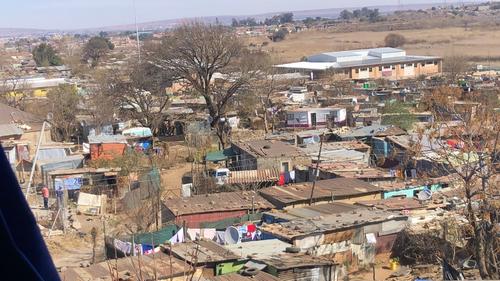411
How Deadly Pesticides Ended Up in the Food of South Africa’s Poorest Communities

In Soweto, one of South Africa’s largest townships, Edith Lokwane’s 7-year-old daughter came close to death after eating samosas and buns on her way home from school last October. Hours later, she was vomiting uncontrollably, barely able to breathe. One of her classmates died.
This is not an isolated tragedy. In November 2024, at least 23 children in Soweto died, and nearly 900 fell ill after eating food contaminated with terbufos and aldicarb — highly toxic pesticides meant for agricultural use. The Department of Health confirmed to Parliament that the deaths were due to “consumption of food contaminated with highly neurotoxic pesticides.”
But how did pesticides — many banned in the EU and Zimbabwe — end up in food sold in poor South African neighborhoods?
A Crisis Born of Decay and Desperation
Terbufos is classified as a “highly hazardous pesticide” and is not meant for household use. “It is fatal to humans if swallowed,” warns Patricia Forbes, head of the Environmental Monitoring and Sensing Research Group at the University of Pretoria.
As municipal decay worsens in South Africa’s cities, basic services like garbage collection and rat control have collapsed. In response, desperate township residents have turned to the black market, where unscrupulous dealers sell terbufos and aldicarb as makeshift rat poison. These chemicals are often sold in unlabelled plastic bags, with no safety instructions.
“It’s a full-blown crisis,” says Marais de Vaal of Afriforum. In 2024, only 14% of landfill sites audited by the group met national biosafety standards. The lack of municipal services, especially in impoverished areas, has made pest infestations—and dangerous DIY solutions—a new norm.
Misdirected Blame and Xenophobic Violence
When the poisonings began in mid-2023, suspicion and anger turned toward foreign-run shops. Refugees from Pakistan, Somalia, and Nigeria—many of whom operate cheap grocery outlets in poor areas—were falsely accused of poisoning children.
Violence followed. Shops were looted. Owners like Hamid*, a Somali refugee, fled for safety. “We continue to be hunted,” he said from Pretoria, where he has taken refuge.
Investigations by the National Institute for Communicable Diseases eventually revealed that the source was contaminated food tainted by pesticide repackaging and mismanagement—not a targeted act of poisoning.
A Broken Food System for the Poor
South Africa’s food landscape reflects its inequality. “There is a two-tier food system,” says Paula Knipe, a legal researcher at the Dullah Omar Institute. “The affluent buy clean, regulated food from supermarkets. The poor are left with cheaper food that’s often expired, unlabelled or uninspected.”
While South Africa boasts a sophisticated agricultural industry, that prosperity rarely trickles down to the working-class Black communities where food insecurity and health risks collide.
Environmental technician Shamiso Mupara is blunt: “We didn’t learn the lessons from the listeriosis outbreak in 2017. We’re repeating the same mistakes, only now it’s pesticides.”
Government Crackdowns—Too Little, Too Late?
Following national outrage, the South African government launched high-profile raids in December 2024, targeting migrant-run food shops in the townships. Over a thousand outlets were shut down, with officials demanding they register on a government database.
Lokwane, whose daughter nearly died, calls the crackdown “a populist stunt to save face.”
Campaigners are now pushing for an urgent ban on terbufos and aldicarb, but there’s little clarity about how many other hazardous pesticides are even legally allowed in the country. The agriculture ministry does not maintain a transparent, public registry of chemicals currently in use.
Until such oversight exists, families in South Africa’s poorest neighborhoods remain exposed to unseen, unlabelled poisons—another layer of injustice in a country already divided by economic and racial lines.
{Source: Chemistry World}
Follow Joburg ETC on Facebook, Twitter , TikTok and Instagram
For more News in Johannesburg, visit joburgetc.com



















